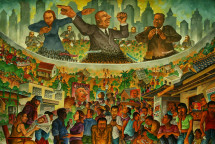Disaster colonialism and agroecological brigades in post-disaster Puerto Rico
Topics
Regions
What are the roots of Puerto Rico’s unending nightmare?

Authors
And what is at the heart of the survival and persistence of Puerto Rican peasant farmers, despite decades of colonial experimentation and modernization policies with the explicit purpose of undermining peasant production and displacing the population to ward the metropolis?
An apostle of Latin American populism, Luis Muñoz Marin, carried forward Operation Bootstrap in the 1950s to empty the countryside at the same time as he pushed forward the model of Free Associated State, which remains the official title of Puerto Rico’s colonial status. The eventual cementing of the consumerist, dependent position of the population, and the colonial mentality of elected leaders, set the stage for the accumulation of external debt during recent decades and the ongoing saga of the island’s ‘unpayable’ debt.
The striking disregard for Puerto Rico’s humanitarian crisis after Hurricane Maria — in the form of racially-tinged, open hostility from the US Executive Branch, and authoritarian denial by the Puerto Rican authorities — laid bare a changing US interpretation of the colonial relationship. This rapidly shifting landscape transformed peasant survival strategies in the immediate and longer terms. Filling the gap left by governmental bureaucracies and abandonment, Puerto Rican social movements expanded a historical model — voluntary work brigades — to bring mutual support to hundreds of farms in the days, weeks and months after the storm. These daily brigades represent two movements of resources and priorities: on the part of popular organizations, they signify a nearly complete shift toward mobilization of people, tools, labor and time into the farms of the Puerto Rican countryside; for peasant families, they have meant a temporary shift toward labor-intensive recuperation of production with a strong basis in moral economies. In this paper, we explore a first round of evidence to corroborate, challenge and deepen our understanding of the connection between the hostile historical conjecture of disaster colonialism, and peasant resistances along neo-Chayanovian balances.
One of the essential features of peasant agriculture is found in its capacity to produce the conditions upon which it depends; factors such as soil fertility, quality seeds and breeds, and skilled labor are all part of what preceding pro ductive cycles created, rather than commodities which must be mobilized by market mechanisms, as in credit-dependent, entrepreneurial farming. An autonomous reproduction process, part of the production process within peasant farming, is a source of stability and resilience, especially in broader contexts in which markets are not reliable for creating a positive cost-benefit balance for farmers. Peasant survival strategies, theorized by Alexander Chayanov nearly one hundred years ago, include the autonomous reproduction of family capital through productive activities, as well as intricate and flexible balances among diverse interests, such as nutrition, rest, festivities and future generations. Historically, the jíbaro culture has been the sanctuary for cultural and material independence.
However, emerging evidence from Puerto Rico may show the need for updated theory of autonomous and collective survival in an era of unprecedented climate vulnerability and porous divisions between urban and rural worlds. The construction of popular territories by collective actors is necessary and a challenge to modern concepts of knowledge, learning and economy. Faced with debt peonage and a long-term capitalist strategy to continue the depopulation of their islands, Puerto Ricans are living a moment of decision. The island has all the physical characteristics to grow its own food and there is a generation of young people who do not want to migrate to the United States, preferring to grow roots by producing healthy food. There is every potential for a radical paradigm shift, away from the increasingly unstable state of food dependency and toward a horizon of agroecological food systems embedded in Puerto Rico’s dense forest ecosystems.
Finally, current academic and journalistic debates on the demise of democracy and the rise of autocratic powers are wise to remember the unfinished, and, in many cases, the dismembered nature of democratic political rights in the heart of the ideological center of capitalist democracy. Indeed, the very rise of nationalist rightwing politics in the US has been facilitated by unequal voting right s, which impede the possibilities for US citizens of color to prevent racist insurgencies from consolidating into white nationalist power. Nowhere is this clearer than in the US’ island territorial possessions, where 4.1 million US citizens, 98.4% of them racial or ethnic minorities, are denied the right to any representation in the US government. The Caribbean and Pacific peoples can no longer be held hostage to disaster colonialism.
This paper was presented at the Emancipatory Rural Politics Initiative (ERPI) 2018 Conference: "Authoritarian Populism and the Rural World"